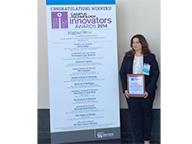Faculty News
—
Prof. Scott Galloway discusses innovation and large companies
—

Excerpt from Bloomberg TV -- "Big companies typically don't want to disrupt themselves. I would argue both Steve Jobs and Ballmer were innovators. Constant product innovation that they were able to get a higher price. But the problem is when you raise your prices faster than inflation...you make yourself vulnerable to startups who will come in and give you a bad version of Word, in the Cloud, for free. Free is a really attractive price. Those disruptors go after the customers that Microsoft doesn't want and slowly start nipping at their heels and nipping at their shins and before they know it they're taking the whole torso into the great white shark of a disruptor. So both companies [Apple and Microsoft] are vulnerable to disruption."
Faculty News
—

Excerpt from Bloomberg TV -- "Big companies typically don't want to disrupt themselves. I would argue both Steve Jobs and Ballmer were innovators. Constant product innovation that they were able to get a higher price. But the problem is when you raise your prices faster than inflation...you make yourself vulnerable to startups who will come in and give you a bad version of Word, in the Cloud, for free. Free is a really attractive price. Those disruptors go after the customers that Microsoft doesn't want and slowly start nipping at their heels and nipping at their shins and before they know it they're taking the whole torso into the great white shark of a disruptor. So both companies [Apple and Microsoft] are vulnerable to disruption."

















